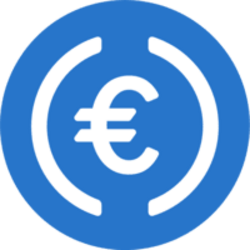
Circle Launches EURC Stablecoin Directly on Solana Blockchain
- Circle Launches Euro Stablecoin on Solana Network
- Solana's Advantage for Stablecoin
- The Potential of EURC
- Market Predictions for Stablecoins
- Behind the Euro-Pegged Cryptocurrency
- Future Regulations and Benefits for EURC
Circle Launches Euro Stablecoin on Solana Network
Circle, a stablecoin issuer, recently launched its euro-backed stablecoin,  EURC$1.10 -0.08%, on the
EURC$1.10 -0.08%, on the  Solana$104 5.03% (SOL) blockchain. The deployment aims to enhance on-chain foreign exchange transactions and remittances. Circle has expressed intentions for EURC to operate as a regulated e-money token under EU regulations.
Solana$104 5.03% (SOL) blockchain. The deployment aims to enhance on-chain foreign exchange transactions and remittances. Circle has expressed intentions for EURC to operate as a regulated e-money token under EU regulations.
Solana's Advantage for Stablecoin
Solana is celebrated for its fast-paced transactions, affordability, and support for a variety of ecosystem applications. Several Solana-based decentralized finance (DeFi) apps and digital wallets, such as  Jupiter information" data-id="5052">
Jupiter information" data-id="5052"> Jupiter$0.0058 -4.87% Exchange, Meteora,
Jupiter$0.0058 -4.87% Exchange, Meteora,  Orca, and
Orca, and  Phoenix$1.05 -3.25%, have integrated support for the stablecoin. This facilitates round-the-clock foreign-exchange transactions, trading, borrowing, and lending with the token. The extension to Solana follows native implementations on Avalanche (AVAX),
Phoenix$1.05 -3.25%, have integrated support for the stablecoin. This facilitates round-the-clock foreign-exchange transactions, trading, borrowing, and lending with the token. The extension to Solana follows native implementations on Avalanche (AVAX),  Ethereum$2,315 -2.42% (ETH), and Stellar (XLM) blockchains.
Ethereum$2,315 -2.42% (ETH), and Stellar (XLM) blockchains.
The Potential of EURC
Circle believes that EURC has the potential to significantly improve utility across peer-to-peer transfers and European remittance corridors. Stablecoins, representing a $130 billion asset class, are a crucial component in the digital asset market. They function as a bridge between government-issued fiat money and cryptocurrencies, supporting trading and transactions on blockchain networks. Besides, they are increasingly utilized for savings in developing nations with vulnerable financial systems and for remittances across borders. These transactions are faster and cheaper than traditional banking alternatives.
Market Predictions for Stablecoins
Earlier this year, research firm Bernstein projected that stablecoins could potentially grow to nearly $3 trillion in the next five years. This growth prediction is based on the expectation that global financial and consumer platforms will tap the tokens on public blockchains to power value exchange.
Behind the Euro-Pegged Cryptocurrency
Circle, the firm behind the second-largest stablecoin, USDC, introduced the euro-pegged cryptocurrency in June of last year, backed by a combination of European government debt and cash reserves. Despite the dominance of U.S. dollar-pegged tokens in the $130 billion stablecoin market, euro stablecoins have struggled to draw in users. Currently, EURC's market capitalization stands at approximately $55 million. This is in contrast to USDC's $24 billion and market leader tether (USDT)'s $90 billion.
Future Regulations and Benefits for EURC
Circle has plans for EURC to operate as a regulated e-money token under the upcoming European Union-wide digital asset regulations, known as MiCA. The token will offer a secure way for users to hold savings in euros, eliminating the need for a traditional bank account. This presents a powerful tool for those wanting to shield against local currency volatility or devaluation risks that plague several regions globally.
How do you like the article?
Join the discussion on
You may also like
 Jonathan Stoker
Jonathan Stoker